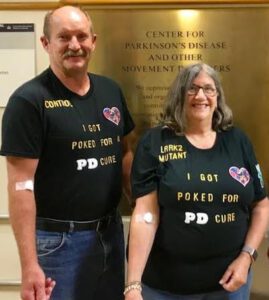Editor’s note: This opinion first appeared in the Lafayette Journal & Courier newspaper. We’re reprinting with permission from the author.

Reni, right, and her husband Kelly.
By Reni Winter-Evans, LSW
I used to think only research scientists could make an impact on medical science, and the rest of us had to just wait for each new treatment and cure without any input.
Like you, I’ve watched helplessly as people I care about die from incurable diseases. Maybe it was a close friend, a parent, a sibling, a spouse or even tragic — a child or infant.
Or perhaps like me, you’ve suddenly found yourself in the crosshairs of a tough diagnosis, one with no known cure.
I’m Not A Scientist
If I were a scientist, I’d be busy in my lab 24-7, doing everything possible to find a cure for the disease that has already destroyed about half of the dopamine neurons in my brain. Loss of dopamine, a neurotransmitter that sends signals to other nerve cells to control large and small muscles throughout the body, as well as mood and other functions, is the start of a handful of Parkinsonism diseases.
But I don’t have what it takes to be a scientist. I’m am a 64-year-old grandma, blogger and former journalist, now a licensed social worker. After 18 months on a hospice team, I work as a community health therapist — a far cry from medical research.
Sign Me Up
But I discovered last year I, and you, do have something vital to offer to help find new treatments and cures for Parkinson’s and other diseases: our DNA.
DNA is the unique building block of our cells. After DNA testing with 23andMe, I learned I have a rare genetic mutation that, coupled with my Ashkenazi Jewish and North African Berber ancestry, puts me at a higher risk for Parkinson’s disease. The mutation, LRRK2 G2019s, is of great interest to researchers working on slowing or stopping the rising tide of Parkinson’s disease around the world. Scientists desperately need people like me with this LRRK2 mutation for research trials — many funded by the Michael J. Fox Foundation.
What? Research scientists need something I’ve got that may cure Parkinson’s? I couldn’t sign up fast enough!
A Sense of Duty
In the past year, I’ve joined almost a dozen observational trials, with more to follow. And they don’t just need people with certain mutations, but also those without to function as “controls” for the studies. Almost anyone can step up to help.
So, we don’t need a PhD, medical degree or even a rare mutation to help with medical research. All we have to do is find a trial we like and enroll. Some can even be done online! So far, I’ve enrolled in the 13-year long Parkinson’s Progression Markers Initiative (PPMI), the Healthy Brain Registry, Fox Insight, and others. You can find research trials in numerous ways: at Fox TrialFinder, at The National Institutes of Health site, or at a research hospital near you. 23andMe invites customers to participate in their company’s research as well.
I do it because I feel a strong sense of duty to help in any way possible to provide a disease-free future for myself, my offspring and everyone else. My focus is Parkinson’s, but active research is ongoing for cancer, multiple sclerosis, Alzheimer’s, and myriad other diseases and all need willing participants. Sadly, countless valuable and well-researched studies have failed partway through for lack of study participants.
Participating is Easy
Remember, only clinical trials involve experimental drugs and procedures. There are plenty of observational trials in which researchers either look at data already gathered from DNA or perform other non-invasive tests on live participants.
One person’s DNA, when studied together with the DNA of thousands, or even millions of others, could lead to a cure or treatment. The higher the number of participants, the more accurate the results and the sooner they can be scientifically validated. Whether we have a diagnosis or mutation or not, we each have the potential to make a big difference by providing enough test subjects to prove a theory and find a cure.
It’s challenging enough finding enough people with a disease to participate. Most cancer trials don’t meet their enrollment targets. One estimate shows less than three-percent of cancer patients participate in trials. Finding “healthy controls” — people without a condition but who are willing to participate, like my husband — is even harder.
Many don’t understand what’s involved, and don’t take time to learn more. Scrambling to find participants lengthens the time it takes to develop a drug or procedure. It might sound scary to sign up for a clinical trial, but remember, every successful treatment prescribed today went through a trial phase. Those treatments wouldn’t be available if courageous people hadn’t stepped up and volunteered.
I decided to be one of those people, recalling the words of Hillel the Elder, an ancient Jewish religious leader: “If not me, then who? If not now, then when?”
I’ve made my decision. What about you?
Reni Winter-Evans, a former journalist now working as a licensed social worker, lives in West Point, Indiana and participates in 23andMe research.